Iran Press/ Iran news:
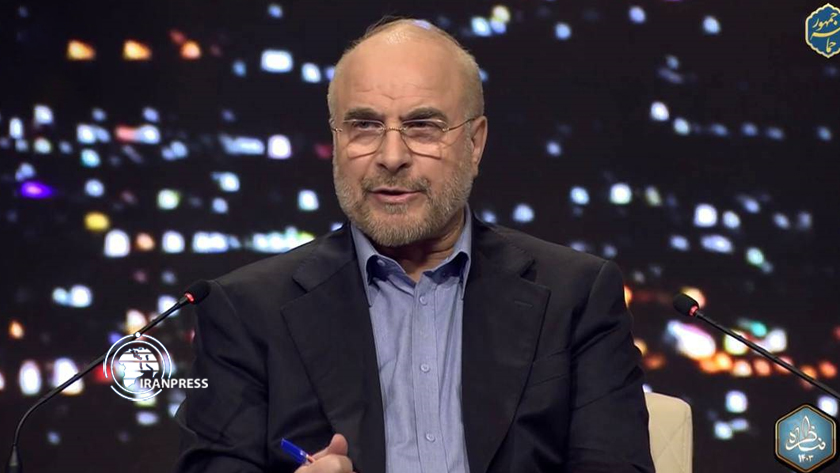
Mohammad Bagher Ghalibaf was the first candidate to start the debate; he stressed the livelihood of the people and the economic growth of the country.
He said in his administration he would control inflation with the participation of the people to realize their rights.
He stressed the livelihood improvement of the middle and lower classes of the society including the workers, clerks, and aid-seekers.
Mohammad Bagher Ghalibaf stressed that besides the issue of the economy, the labor culture, production culture, and consumption culture must be taken into consideration in administering the country.
Productivity was another issue pointed to as an important factor in the economic growth of Iran and the next president should utilize the capacity of the scholars and experts to reach productivity.
As with productivity, Ghalibaf criticized the wasting of the country's resources, especially in the energy sector, for example, the flare gas of which 7.5% of its energy is used and could reach 15%.
Concerning sanctions and the way to lift them, he went on: "Even in the field of sanctions, I believe that all the of the administrative agencies are on one side and the diplomatic system of the country is on the other side to take action to remove the sanctions."
Regional treaties such as BRICS and Shanghai Cooperation Organization were the other capacities he stressed that should be benefited from to increase the productivity and the economic growth of the country.
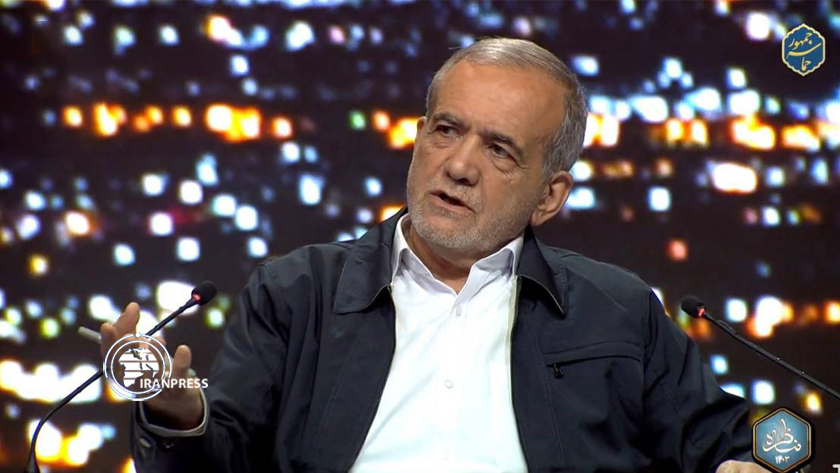
Masoud Pezeskian stressed the use of unity and participation of the people in administering the country and avoiding partisan behaviors.
He referred to the 7th plan of development for Iran and the 8 percent growth predicted in the plan and noted that to reach the goal the country's door must be opened to the world.
The feasibility of the economic plans adopted by the parliament was the other point he talked about.
He noted that the economic situation of the country must be predictable so that the businessmen dare to invest and continue their activities.
Pezeshkian stressed the use of international experiences and that no country has reached economic growth without foreign investment and exports.
He called sanctions on the country a catastrophe because some abuse the continuing sanctions.
He stressed transparency in the economy and marketing to have trade with the world.
Pezeshkian tied the foreign investments to the FATF mechanism and noted: "To have a proper business partner with these sanctions is impossible unless some people get together to become an alleged business company."
He referred to Ghalibaf's notion of productivity in the energy sector and said that productivity is not achieved through importing the relevant technologies for extracting energy sources such as oil.
The candidate said management incentives must not be assigned to a person who just imposes heavy costs on the country, and stressed the use of those people with skill, knowledge, and motivation in the administrative body of the country.
"It is not possible for us to progress without people's participation, without solving differences and problems, without relying on scientific and international experiences, and without opening the market [to the world]," he reiterated.
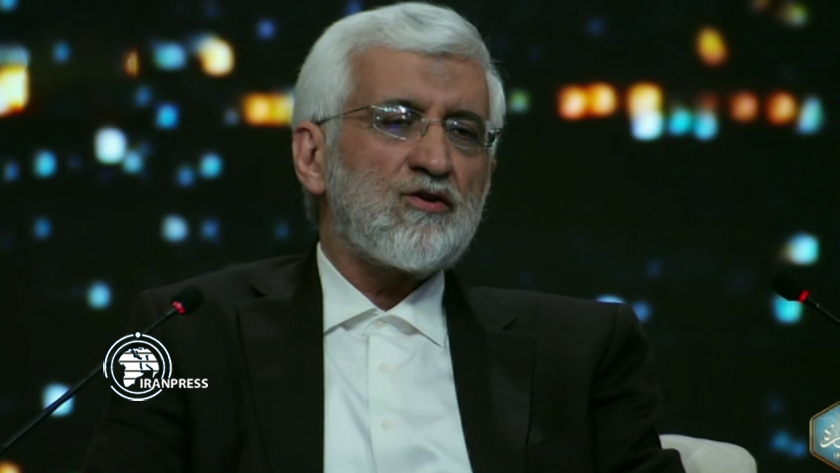
Saeed Jalili referred to the very 8 percent growth and said that the people should choose the one who can well realize the growth adopted in the development plan.
He stressed that economic growth must not be confined to mere investment, enumerating management, human resources, and capital as other elements necessary for the very growth.
Presenting his motto "one world of opportunities, a whole Iran progress surge," Saeed Jalili stressed the identification of the opportunities in the country and noted that universities and professors are the capitals of the country and should be given a mission to realize the development plan.
The candidate said that the country's problems and challenges are solvable such that the American authorities admitted that the late Raisi's administration overcame the West's maximum pressure on Iran.
He noted: "Some candidates believe in only foreign experience. It should be emphasized that in addition to global experience, we should use our academic and scientific experience and manage our economy based on local and of course foreign knowledge."
Jalili pointed to the central role of the Rial, the national currency, in curbing inflation noting that a powerful administration must be able to practice sovereignty on the Rial and it must be able to know where the money goes, how it is spent, and where it is present so that the administration can govern the affairs.
He also tied the control of inflation to the control of the foreign currency rate.
The presidential candidate reiterated that ground should be prepared that every Iranian could play a role, and that decisions should not be made without considering the capacities in all dimensions.
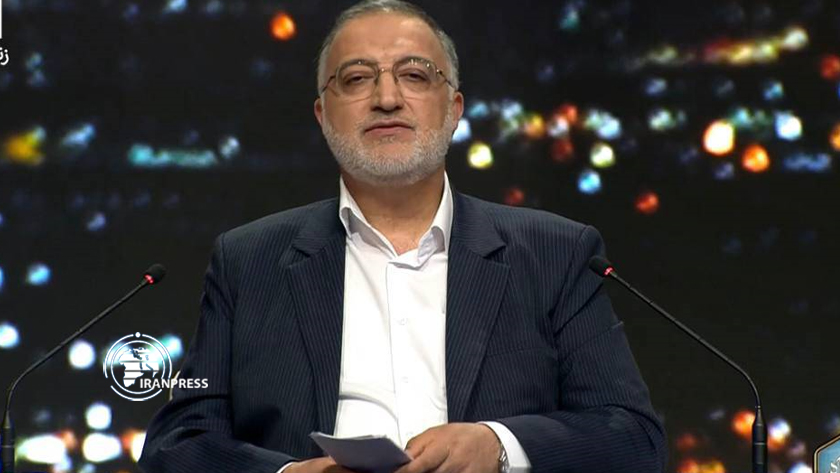
Alireza Zakani pointed out that Iran's problem is not the US sanctions but the US economic prescriptions that are used in the country's economy.
He put his emphasis on the economic independence of the country based on de-dollarization and reliance on the power of the national currency.
Knowledge-based production, production with high value-added, reliance on people's participation, and fair distribution of wealth were the points he stressed as the factors of economic growth.
He referred to liquidity as a challenging issue in the country's economy and noted that it is important that liquidity does not go around and a special point is set for it to be invested there.
Zakani exampled Turkey as a country that is suffering from such a problem, saying that in 2023, Turkey had an exported of 250 billion dollars, but it has now 70% inflation, and the value of the country's lira has reached 32 lire per dollar from 5 lire per dollar 5 years ago.
He emphasized the role of people in the very 8 percent economic growth of the country and noted that the driving force of the economy must be the private sector.
Concerning the sanctions imposed on Iran, he believed that the sanctions must be neutralized from within the country and with the reliance on the domestic capacity after that diplomacy change their foundation.
He stressed transparency and the people's supervision of the administration and reiterated that people must have direct participation in the national economy to keep their support of the Islamic Republic.
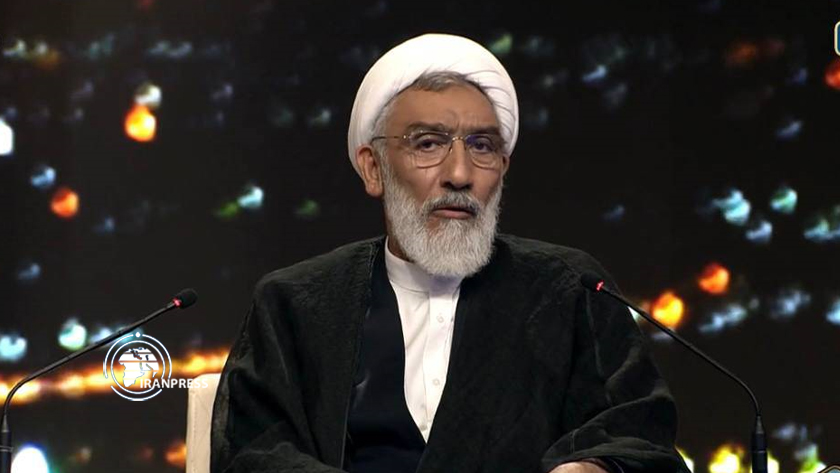
Still, Mostafa Pour-Mohammadi pointed to the sanctions on Iran and considered the disruption in the banking transactions of the country one of the consequences of the stations.
He stressed reaching a consensus on national unity and building trust among the people as the administration pursued a frank way of talking to them about the problems of the country.
Mostafa Pour-Mohammadi highlighted the importance of productivity and the optimal use of the resources yet he noted that reaching productivity would be impossible with managers who lack sufficient expertise.
As with the issue of sanctions, he criticized some ongoing trends in the country; Pour-Mohammadi said: "We increase the self-imposed sanctions, then we expect to remove the foreign-imposed sanctions."
He stressed that to administer the country needs the trust and participation of the people and to reach this, the necessary infrastructure must be provided.
National unity and harmony among the country's officials to solve the challenges were the issues the candidate put his emphasis on.
Still, he pointed to competition as a principle in economic development and stressed that the government must withdraw from the competition and put aside command economy while practicing financial discipline.
He believed in a resistive economy and said that he would put it at the center of his administration's discourse.
The government is not a contractor or a corporation, neither is it the management of a hospital, a city, or a research institute; the government is a set of capacities, a country, a nation, a history, a culture, an identity, and a civilization, the candidate pointed out.
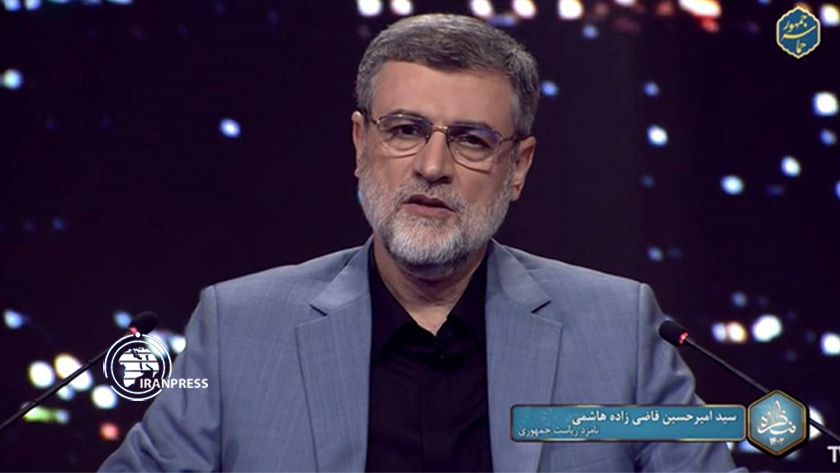
Amir-Hossein Ghazizadeh Hashemi another candidate said that people are paying the price for the official's mistakes so we have to lead the economic policies of the country toward production and investment, in favor of the Iranian people.
He also stressed the use of technology and knowledge-based companies for beneficial production and fostering a ground for competition in the economic arena.
Stressing that the share of the administration must be reduced in people's lives, Ghazizadeh Hashemi stressed that the administration must not compete with the private sector.
He committed himself to continue the late President Raisi's path in case he was elected president and said that reduction of inflation to a number under 10 is possible only by a Raisi-style political authority
To control inflation three issues must be addressed, including monetary-financial organization, improvement of productivity, and settlement of political issues, the candidate believed.
Ghazizadeh Hashemi said: "That we managed to control the currency tension in recent years is a sign of endogenous political authority and is not caused by a foreign-oriented approach; The fact that we are impacted the least by political tensions today is due to the increase in power and authority in the banking and monetary areas."
As with controlling liquidity, he stated that command performances and nepotism in correcting the current banking system.
The candidate promised that if he was elected president, he would employ the youth in the administration and follow the late President Raisi's causes to move the country toward prosperity.
206
Read More:
Iranian Presidential Candidates on Stage for First Debate Tonight
ahmad shirzadian

